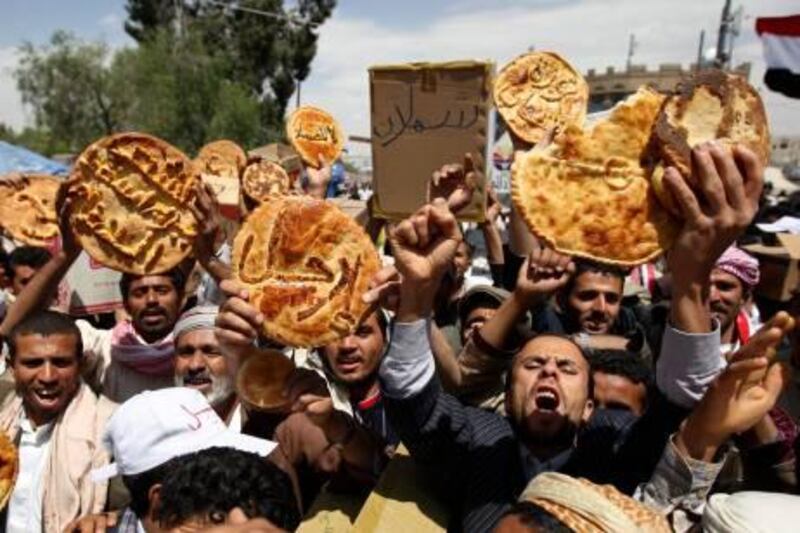SANAA // Three Yemeni officers and three soldiers were killed yesterday in an attack by suspected al Qa'eda militants, adding more stress on the fragile government of President Ali Abdullah Saleh.
The attacks came as London and Washington called on their citizens to consider leaving Yemen, which has seen weeks of anti-government protests demanding the resignation of Mr Saleh, who has been in power for 33 years.
Three soldiers and an officer who belonged to the Republican Guards were ambushed as they were driving an army vehicle to distribute food to troops at checkpoints north of Marib city, about 170 kilometres east of Sanaa. Naji al Zaidi, a Marib governor, blamed al Qa'eda. He told the army website that a military attack helicopter and ground troops started a manhunt to pursue the attackers.
In the province of Abyan, Col Abdulhameed al Sharabi, an intelligence officer, was killed in a similar attack by suspected al Qa'eda militants. Security sources said that men on bicycles shot and killed the colonel in the vegetable market of Zinjibar city.
Shaif al Shaibi, an intelligence officer, was also killed yesterday in a similar attack in Seyoun city, in the province of Hadramaut. Marib and Abyan provinces are considered to be the main strongholds of al Qa'eda in the Arabian Peninsula.
On February 22, five people, including three soldiers, were killed in a gun battle with al Qa'eda fighters in Marib, the defence ministry said.
In addition, 12 soldiers were killed by suspected al Qa'eda militants in ambushes on military convoys and an attack on a military checkpoint in the south of the country.
The US state department advised Americans not to travel to Yemen and said US citizens in the country should consider leaving.
"The security threat level in Yemen is extremely high due to terrorist activities and civil unrest," the US state department said in a warning yesterday.
The department also said that it had authorised family members of US Embassy staff and non-essential personnel to leave the country.
Meanwhile, more than 40 people were injured when they were attacked by government supporters in the province of Ibb. Sources said thousands of government supporters attacked protesters with daggers, batons and gunfire. The protesters have been staging a demonstration at Freedom Square for the past 20 days.
"The thugs of the ruling party warned us on Saturday evening to leave the square or they would attack us," Mohammed al Badani, a protester, said in a telephone interview.
"One of the protesters was stabbed in his heart and another was shot on his head. The two are in a serious condition," Mr al Badani said.
Violence has marked recent weeks of protests, where government supporters clashed with pro-democracy protesters. About 24 people have been killed in three weeks of protests. Yesterday's violence comes one day after Mr Saleh rejected a plan for his peaceful exit from power this year. He said he would leave power only after his term ends in 2013.
The opposition vowed yesterday it would end Mr Saleh's regime peacefully.
"We will face your bullets with bare chests and we will not be trapped into violence. We will topple this regime peacefully," said Mohammed Qahtan, an opposition spokesman.
In protest at the violence against protesters, Sheikh Hasan Enan, an MP in the ruling General People's Congress, resigned yesterday. His resignation raises the number of the MPs who have quit the party to 15 since the protests started.





